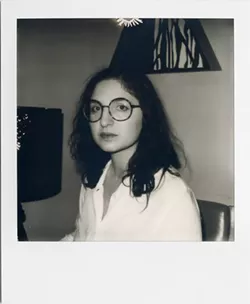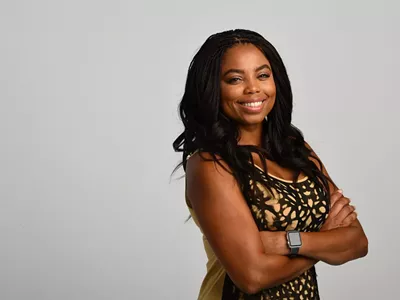Follow your heart and your dreams will come true is a cutesy Hallmark sentiment. Follow your heart and your dreams will probably come crashing into a heap around you is the more realistic version, one that is achingly depicted in Detroit-based author Kat Gardiner’s debut collection of short fiction, Little Wonder.
Out Oct. 5 on Father/Daughter Records, Little Wonder is a fictionalized “adult coming-of-age” story about Gardiner’s experience of opening — and then closing — an all-ages music venue/café with her husband in the small Northwest town of Anacortes, Wash., in 2008.
Gardiner’s meditative lyrical style is served well by the fragmentary microfiction format. Contemplative and exposed, her words often read more like prose poetry than typical fiction. The non-linear narrative is disorienting at times, a perfect mirror of the disorienting experience of desperately trying to run a café that seems destined to fail.
The stories vacillate from raw expressions of physical spaces — “I ran my finger along the cheap wood, over an edge of peeled paint and felt how it wanted to peel away even more” from the story “We Lived There For A Year and Never Unpacked” — to nuance expertly conveyed via cooking; in one piece called “Double Standards,” Gardiner depicts two different ways to use butter that is so well done you can’t believe you’re reading something so emotionally vulnerable vis-à-vis butter.
And, of course, there’s the music. The stories are fictionalized, but the musical references throughout are real — and Gardiner did this for a reason. (More on that below). The musicians in the book, a cast of folks key to the Pacific Northwest scene, include Little Wings, Mirah, Neko Case, Karl Blau, Tiny Vipers, and Calvin Johnson — among many more.
In advance of her reading at Third Man Records, with a special solo performance by Fred Thomas, we chatted with Gardiner about the real-life inspirations behind some of the characters, the power of challenging yourself, and more.
Metro Times: What inspired you to write about this period in your life?
Kat Gardiner: When I started writing this collection, I had just had a baby and had been working on another novel for about ten years. When the birth happened and all of my writing time was taken away from me — for good reasons, no shame on my baby [laughs] — I felt I was getting disconnected from my creative self, so I gave myself a challenge to write 100 microfiction stories in 100 days. I wanted to do it around a specific concept, and I landed on this one.
Some of the people from that time period have remained in our lives but most of them have changed. It was such a significant portion of my life. I learned a lot about myself and about life, and I've wanted to write about it for years and years, and the time was never right. But this method of revisiting it, day after day in these snapshots, was a really good way for me to tell that story.
The more I think about it, [the more] it reflects how memory feels to me, how memory isn't a linear curve, it's a lot of little moments that add up together to form all of the growth and experiences you've had. It was a story I knew I needed to tell and the [microfiction format] offered me an opportunity to tell it in a way that did it justice.
MT: I like your comments about memory because that was one of the things that stood out to me the most reading it, the non-linear aspect. It puts a unique spin on what you've done. I was going to ask why this format, but you've already answered that.
Gardiner: It started out as circumstance, as a writing test to myself, and it morphed into the best way that this story could have been told. I wouldn't rewrite it any other way.
MT: Did you have a ritual while writing these stories?
Gardiner: A good six months of my life was spent nursing a child. Most of the stories in this collection were written during that time period, so the ritual was nursing my baby. As I got to writing it, a lot of the stories became written for her. One of the last stories in the collection is about reflecting back on how you tell people that you care about, in my case specifically my child, how do you tell them about lives that you once lived that no longer exist. So a lot of it was trying to tell her this story and I think that just happened organically from the fact that most of the time I was writing the story, she was eating off of my body. [Laughs.]
MT: Not all of them, but many of the titles seem to be concluding statements that make sense after you've read the story. Was that something you were consciously doing?
Gardiner: On some of them, for sure. With the brevity of microfiction, every word takes up so much real estate. The title can really be a great place to add a different level onto the story itself. If you're looking proportionately, the title is a much greater fraction of the story than in traditional short stories or larger works of fiction.
MT: Do you have a favorite character?
Gardiner: My favorite was always writing the one-off customers that came in. Some of the ongoing characters are more closely aligned with people I had a deeper relationship with, [but] the customers are just people I remember who I'm never going to see again, so I felt like I had a lot more leniency to take them a couple steps further and still preserve the truth that I was trying to tell in the greater story.
My favorite character that I wrote was the old woman who makes a library in a bottle. That was loosely based on someone who did a different form of outsider art that I just found completely amazing. The real inspiration for that character was in her 70s and spent her entire life collecting Donald Duck heads. She would epoxy them onto other different characters and then spray paint them gold. Throughout her house, she had mounted animal heads with Donald Duck's face on them, spray-painted gold. Her work blew my mind. That was a really fun character to create because in the fictionalization I was able to really branch out and think of a different way to represent her and her importance in that town.
MT: Music is obviously very important to the book and to you. Can you tell me about that relationship?
Gardiner: I've always felt more at home in the independent music community than I have in any other community I've encountered in my life, including the literary community. The sense of community in those making music for the sake of making music, putting themselves out there and doing it on their own terms, [has led me to] my favorite people. Music itself has been such an inspiration to me, both in literary terms and just life in general. My husband works in music, so I've kept pretty close to it in that way. Music has a universality to it that a lot of other art forms, for me, don't have. It can ring into the deepest levels of my psyche that a lot of other art forms can't.
I included the real names of the bands playing the café because I think it's really important that we support the small musicians out there. Bands that you think would be able to live healthy lives are struggling because their work is not being given the kind of financial worth it deserves. I wanted to do what I could, in the stories especially and also with my tour, [on which] I'm playing with musicians everywhere. Whatever I can do to bring people who I believe are making beautiful, important music to other people's attention who might not have heard of them in other ways, I want to do. I want to support that community as much as I can.
Kat Gardiner reads from her book on Thursday at Third Man Records with special guests and a performance by Fred Thomas; Doors at 6 p.m.; 441 Canfield St W, Detroit; thirdmanrecords.com; free.
She is also reading on Wednesday, Sept. 19th at Literati Bookstore with a performance by Eliza Godfrey; 7pm; 124 E Washington St, Ann Arbor; literatibookstore.com; free.
You can pre-order Little Wonder here.
Get our top picks for the best events in Detroit every Thursday morning. Sign up for our events newsletter.

Audio By Carbonatix
[
{
"name": "GPT - Leaderboard - Inline - Content",
"component": "35519556",
"insertPoint": "5th",
"startingPoint": "3",
"requiredCountToDisplay": "3",
"maxInsertions": 100,
"adList": [
{
"adPreset": "LeaderboardInline"
}
]
}
]






